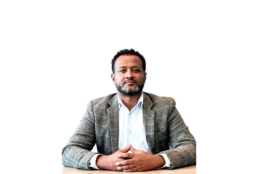The Horn of Africa Regional Security Complex
Exploring the International Peace Support Training Institute
Brig. Gen. Sebsibe Duba
Commandant of IPSTI
International Peace Support Training Institute (IPSTI)
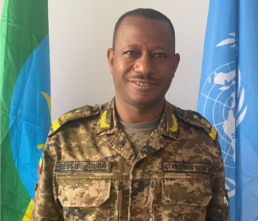
Brig. General Sebsibe Duba is the commandant of the Ethiopian International Peace Support Training Institute. A highly-decorated 29-year veteran of the Ethiopian National Defense Forces, Brig. General Sebsibe most recently served as Chief Training Officer at AMISOM Force Headquarters. He has a Bachelor of Arts in Leadership and Military Sciences from the Ethiopian Defense Command Studies and Staff College and served as Head of the Security and Strategy studies department at the Ethiopian Defense Command. General Sebsibe obtained his Master of Arts in Managing Peace and Security in Africa from Addis Ababa University and holds a post-graduate Advanced Diploma in Defense and Strategic Studies from the National Defense University (NDU) of China.
Ethiopia has deployed over 150,000 personnel for peace operations, both under Chapters 6 and 7 of the UN Charter.
Ethiopia has a long and illustrious history of international peacekeeping support. As a founding member of both the United Nations (UN) and the African Union (AU), the nation’s participation in UN-authorized operations dates back to 1951; since then, Ethiopia has deployed over 150,000 personnel for peace operations, both under Chapters 6 and 7 of the UN Charter. Its deployments range from infantry units, tactical and utility, helicopter units, motorized battalions, and mechanized battalions, to hospital and well drilling units.
Established under the Peace Keeping Center (PKC) in 2010, the IPSTI is dedicated to training security sector leaders both from Ethiopia and other African countries. The IPSTI provides over 25 courses on various thematic and functional areas tailored for both national and international participants, i.e. military, police, and civilian students. The institute’s coursework is structured around conflict prevention, post-conflict recovery, and other cross-cutting disciplines. IPSTI is lauded for its individualized attention to participants and discussion-based learning. The Institute’s campus includes training and office facilities, a canteen, accommodations, and a theatre facility. According to the Commandant of the Institute, IPSTI aims to become a premier center of excellence in peace support training, education, and research in Africa.
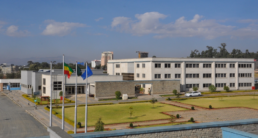
IPSTI campus, Addis Ababa, Ethiopia.

Student Residence on campus, Addis Ababa.
Commandant Brig. Gen. Sebsibe adds that the Institute aims to become a frontier in peacekeeping pre-deployment training, particularly on UN mandates and compliance, human rights, and gender equality support in Africa.
Commandant Brig. Gen. Sebsibe adds that the Institute aims to become a frontier in peacekeeping pre-deployment training, particularly on UN mandates and compliance, human rights, and gender equality support in Africa. Secondly, the IPSTI offers specialized foreign language training, as well as testing, in preparation for international deployments. The IPSTI offers a robust English and French language training program and is in the process of crafting additional language training and soft-skills programs. Third, IPSTI has a highly specialized Peace and Conflict Management graduate program which comprises accomplished military leaders, as well as enrollees, from around the African continent. Participants are often sponsored by their respective governments to complete the coursework. Lastly, the institute conducts various research on peace support operations and conflicts to promote regional peace.
According to the commandant of the school, regional peace, particularly in a crucial geo-strategic location like the Horn, is a collaborative effort that requires the attention and participation of various stakeholders. Hence, the IPSTI has a range of core and institutional partners ranging from nations like Germany, Japan, and the UK to the United Nations Development Program (UNDP) and the African Union (AU). Through the support of various national and international partners, the IPSTI is able to enhance the capacity of its regional standby forces and further expand its training modules into academic programs.
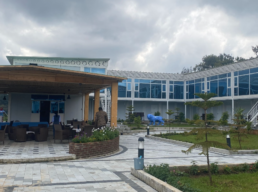
IPSTI training Facility, Near Kebena, Addis Ababa.
Share
China’s “Peaceful Development” agenda in the Horn of Africa
China’s “Peaceful Development” agenda in the Horn of Africa
Getachew Nigatu
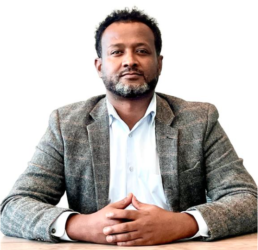
Getachew obtained his first degree from Addis Ababa University’s Political Science and International Relations department PSIR. He holds an M.A. in International Relations from Addis Ababa University and an M.A. from the University of Leeds, UK, in Political Communication. Getachew served as Director General at the Ethiopian Ministry of Foreign Affairs and worked as Secretariat for the Foreign Policy Review Team. Upon Joining the private sector, Getachew worked as a senior political editor at The Reporter Newspaper in Ethiopia.
China’s Foreign Ministry appointed a Special Envoy to the Horn of Africa, Xue Bing attended the first ever ‘China-Horn of Africa Good Governance, Peace and Development Summit held in Addis Ababa, Ethiopia, from June 20 to June 22, 2022. Senior officials and representatives of Ethiopia, Djibouti, Somalia, Kenya, Uganda, Sudan, and South Sudan were in attendance at this event that is to mark a shift in China’s partnership model, particularly with Eastern Africa. Zhao Zhiyuan, China’s Ambassador to Ethiopia, who was also in attendance, insisted on the presence of the Chinese Special Envoy at the summit upon invitation; adding that China doesn’t have any other agenda than assisting development and peace prospects in the Horn of Africa.
The conference, led by H.E. Xue Bing, was also intended to encourage dialogue between the Government of Ethiopia (GoE) and the Tigrayan People’s Liberation Front (TPLF) but looked into discussing the crisis and conflict plaguing the broader region. This raises several critical questions worth considering.
First, what is the actual interest of the Chinese government in the Horn of Africa, particularly, how may this summit serve in bolstering regional peace? It is a fact that Horn States owe the Chinese government billions of dollars in debt, hence conflict conditions and instability in the region will not only result in the loss of critical partners in the region but also a massive economic loss incurred by the Chinese government.
The Chinese Government’s Belt and Road Initiative (BRI) lays out a clear framework for diplomatic engagement, economic cooperation, resource self-sufficiency, and more to expand China’s cooperation with African partners.
The Chinese Government’s Belt and Road Initiative (BRI) lays out a clear framework for diplomatic engagement, economic cooperation, resource self-sufficiency, and more to expand China’s cooperation with African partners. Despite multiple security threats posed by various entities, one must ask: “if not for the geostrategic and economic incentives the Horn region offers, would China’s government have prioritized such a high-level engagement with the region’s governments?” The answer is likely NO. Given the Chinese government’s prior engagements with the African States, it is a recent phenomenon for China to pioneer good governance and peace initiatives in other countries. As is the case with most Horn Governments, China seldom comments on political developments and prefers not to involve in protection, de-escalation, or peacebuilding initiatives. However, The contrary is true when it comes to its deeply entrenched involvement in African economies. What accounts for the sudden shift towards peace and development, as well as good governance? Could it be a protective mechanism for its investment holdings in these countries?
Africa’s stability matters to China. China is not only involved in trade and investment and infrastructure development but Chinese companies are also heavily involved in mineral exploration and widespread mining in Africa. The continent’s rich natural resources, and ample market for services and goods, are increasingly attractive to China; hence instability in Africa means it cannot exploit the mineral and economic prospects in Africa.
However, the terms of these loans are not disclosed to the public- remain a secret between the signatory African heads of state and China.
Africa’s raising debt to the Chinese government exceeds 140 billion USD and at least 18 African countries have been renegotiating the terms of their past agreements. However, the terms of these loans are not disclosed to the public- remaining a secret between the signatory African heads of state and China. These loans, through the so-called “Peaceful Development initiative” often take infrastructures from poor African countries as protection or guarantee. It only becomes public knowledge when countries in debt default on their payment and settlements become difficult.
Chinese loans are often considered predatory. When asked, most African governments and China would claim that their partnership is a “win-win.” However, heavy Chinese investments, particularly in infrastructure development are said to be highly impropriety; the African officials signing these loan agreements often advance their individual interests under the cover of secrecy. The Chinese government itself provides certain shields for corrupt African officials. This is by providing officials from African governments with the power of signing infrastructure loan agreements a grand corruption platform that makes them commit to these unethical loans. The Heritage Foundation in its piece ‘Chinese Corruption in Africa Undermines Beijing’s Rhetoric about friendship in Africa’ claims’ that Beijing either encourages or ignores corruption and that China’s government-linked and government-owned companies habitually use corruption that hurts ordinary Africans.
Infrasture development in Ethiopia and other African countries often fails to repay their loans, further entrenching the into dependency.
Infrasture development in Ethiopia and other African countries often fails to repay their loans, further entrenching the into dependency. For example, six years after launching the first Sub-Saharan Africa light rail system, the Addis Ababa transit system went from bad to worse. According to The Reporter news Paper, during its first four years, the transit system earned a gross revenue of 11 million USD; it, however, needs 154 million USD to operate. The General Auditor’s report shows that the rail system falls far short of its original feasibility study. ‘The feasibility study has been inadequate, and it was conducted without collecting enough information.’ Who is responsible for these kinds of irresponsible loans? Officials in African governments or China?
Share
Professional Development Workshop
Horn Review is hosting a resume and cover letter building workshop designed to help young professionals and students in institutions of higher learning who are exploring the job market. This one-day intensive training will aid young professionals put their best foot forward in their preparations to join the labor force.
Interested in applying?
Send a copy of your university transcript (or proof of current enrollment) along with a one page motivation letter to info@hornreview.org
When : Saturday, Feb 12, 2022
The deadline for application is Monday, February 7
Where : Location details will be announced to finalists.
Share
The Horn Review Scholars Program
The Horn Review Scholars Program (HRSC) is an 8 week intensive training program to highschool seniors with a passion for international relations, diplomacy, political economy of developing nations, as well as quantitative research methods and analysis. The HRSC is dedicated to fostering and equipping upcoming generations of theorists, researchers, and policymakers with technical and quantitative tools, leadership skills, and technical know-how of the current international system.
Applicant requirements:
- Applicants must be high school juniors, or a graduating seniors within the Ethiopian Educational System
- Applicants must have an excellent academic background and good command of the English language
- Along with a complete application, applicants must submit attested copies of their academic records, two letters of recommendation, and a two page thesis proposal no later than May 1st
Applications for HRSP 2022 will open April 1st, 2022.
To learn more about the Horn Review Scholars Program, email us at scholars@hornreview.org
Research Fellowships:
Horn Review annually hosts researchers from accredited academic institutions from Africa, and from around the world, with demonsted research interests or background in the Horn Region, and/or the African Continent.
Applications for the Horn Review research program will open on April 15th, 2022.
To learn more about the Horn Review Research Fellowship, applicant requirements, and academic credits email fellowships@hornreview.org

